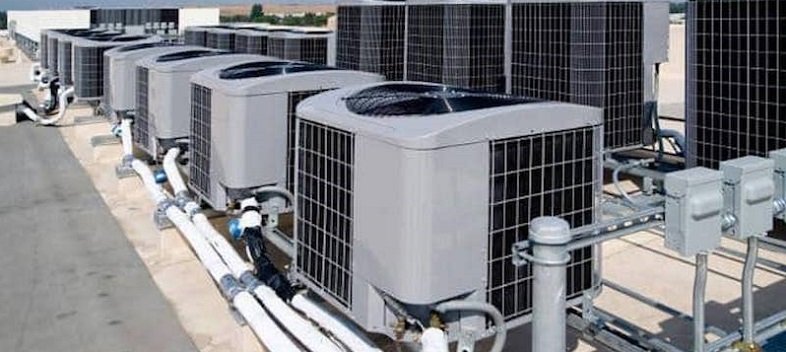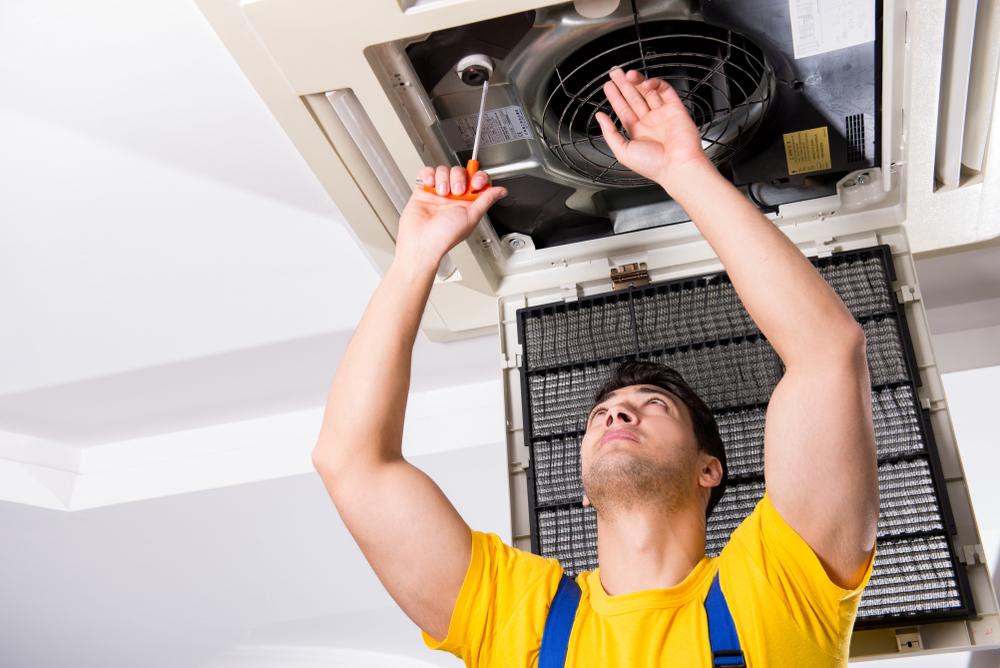Elevate Your Home’s Efficiency with Routine heat pump service
Elevate Your Home’s Efficiency with Routine heat pump service
Blog Article
Choosing In Between a Heatpump and Furnace: Trick Considerations for Your HVAC Needs
When evaluating heating alternatives for HVAC needs, the decision between a heatpump and a heating system can be complex. Each system supplies unique advantages customized to particular climates and power performance objectives. Understanding these distinctions is important for making an educated selection. Trick factors such as setup prices and ecological effect additionally make complex the choice procedure. Which alternative truly lines up with one's comfort and sustainability preferences? The adhering to areas will discover these considerations in detail.
Comprehending Warmth Pumps: Just How They Work and Their Advantages
While several homeowners take into consideration different home heating options, comprehending just how warm pumps function and their advantages can significantly influence their choice. Heat pumps operate by moving warm as opposed to creating it. In the winter months, they remove heat from the outside air or ground and transfer it indoors, while in the summer, they reverse this procedure, cooling the home by getting rid of heat outside. This dual capability makes them flexible for year-round environment control.One of the primary advantages of warm pumps is their power effectiveness. They make use of considerably much less electricity compared to typical heating unit, potentially causing reduced utility expenses (heat pump installation ooltewah tn). In addition, heatpump have a smaller sized carbon impact, making them an eco-friendly option. They likewise require less upkeep than conventional systems, adding to long-lasting cost financial savings. In general, understanding the auto mechanics and advantages of heat pumps can aid home owners make informed choices regarding their home heating and cooling requirements
Exploring Heaters: Kinds, Procedure, and Benefits
Furnaces can be found in numerous kinds, consisting of gas, electrical, and oil models, each with unique operational devices. Recognizing these distinctions is vital, as they affect performance and heating efficiency. Additionally, furnaces use numerous advantages, such as regular heat result and reliability in colder environments.
Kinds of Heaters
Heater can differ considerably in design and operation, with furnaces being a preferred choice amongst property owners. There are numerous sorts of heating systems, each making use of different gas resources and modern technologies. Gas heaters prevail, leveraging gas to generate heat efficiently. Electric furnaces, on the various other hand, make use of electrical resistance to generate heat, frequently favored for their uncomplicated installment. Oil heaters, while less usual, work in locations with limited gas accessibility (ductless mini splits). Additionally, condensing furnaces make best use of energy performance by recycling and capturing exhaust gases. Each kind runs with a system of warmth exchangers and ductwork to distribute warm air throughout a home. Recognizing the distinctions in between these heating system types is vital for educated a/c decisions
Benefits of Furnaces
For home owners seeking reputable warmth during cool months, the advantages of heaters are significant. Heaters offer consistent home heating, guaranteeing even temperature levels throughout the home. They are specifically reliable in extreme chilly, often outperforming heatpump in freezing problems. Numerous types, including gas, electrical, and oil heating systems, offer adaptability to fulfill diverse requirements and preferences.Furnaces also have a tendency to have reduced initial setup costs compared to warmth pumps, making them an extra obtainable option for several. Their durable design contributes to a longer life expectancy, with lots of systems lasting over 15 years with appropriate maintenance. In addition, modern-day heaters are typically furnished with innovative technology for enhanced performance, which can lead to reduced energy expenses. Overall, heaters continue to be a reliable option for efficient home heating.

Energy Performance: Contrasting Warmth Pumps and Furnaces
When comparing power performance between warmth pumps and furnaces, the Seasonal Energy Efficiency Ratio (SEER) plays an essential duty in establishing performance. Furthermore, a functional cost analysis reveals the long-lasting economic effects of each system. Understanding these variables can lead house owners in making notified decisions concerning their heating solutions.
Seasonal Energy Performance Proportion
Power efficiency plays a crucial role in the decision-making process between heat pumps and furnaces, specifically when thinking about the Seasonal Energy Performance Proportion (SEER) This metric measures the cooling performance of heatpump over an entire air conditioning season, providing a standard method to examine performance. Higher SEER rankings indicate higher energy performance, equating to lower power intake and reduced energy costs. On the other hand, heaters are typically assessed using the Annual Fuel Use Performance (AFUE) ranking, which mirrors home heating performance. When contrasting these 2 systems, property owners should focus on SEER scores for heatpump, as they directly influence general power savings and environmental sustainability. A comprehensive understanding of SEER can notably influence the long-term fulfillment and cost-effectiveness of the picked a/c remedy.
Operational Cost Evaluation
Recognizing the operational prices connected with warm pumps and heaters is important for property owners examining their alternatives. Heatpump typically use higher energy efficiency, converting electric power into heat with marginal waste. This causes reduced regular monthly energy expenses, specifically in moderate environments. Conversely, standard heaters, particularly gas versions, may have reduced ahead of time costs however can incur greater functional expenditures over time because of sustain prices and efficiency ratings.Moreover, heatpump can function as both heating and cooling down systems, potentially minimizing the need for separate cooling and heating systems. While initial financial investments for heatpump might be higher, their long-lasting financial savings in energy efficiency can make them a more affordable option for several homes. Mindful analysis of local energy prices is necessary to determine the ideal option.
Installation Prices: What to Anticipate for every Furnace
Installation prices for heater can differ substantially between warm pumps and heaters, influencing house owners' choices. Warmth pumps normally have higher upfront setup expenses, usually varying from $3,500 to $8,000, relying on the unit size and intricacy of installation. This consists of the outside device, indoor handling system, and required ductwork alterations. Conversely, furnaces often tend to have reduced preliminary expenses, averaging in between $2,500 and $6,000, which can be appealing for budget-conscious home owners. Nonetheless, installment costs can enhance if substantial ductwork is required.Moreover, the option of fuel kind for heaters-- all-natural gas, lp, or electrical-- can additionally affect setup costs. While warmth pumps supply power efficiency, their initial investment might deter some buyers. Eventually, assessing installation costs alongside lasting cost savings and effectiveness will aid house owners in making notified choices regarding their furnace.
Environment Considerations: Which System Performs Much Better in Your Area
Exactly how do climate problems influence the efficiency of heating unit? The efficiency of warmth pumps and heating systems can vary substantially depending on the local climate. In modest climates, heatpump stand out by efficiently transferring warmth from the outdoors air, making them an energy-saving alternative. Their efficiency decreases in exceptionally chilly temperatures, where they might have a hard time to remove sufficient warm. On the other hand, heating systems, especially gas models, provide consistent and trusted warmth regardless of exterior problems, making them preferable in cooler regions.In locations that experience milder wintertimes, heatpump can run effectively year-round, offering both heating and air conditioning. On the other hand, areas with harsh winters often profit from the toughness of heaters. Eventually, understanding the local environment is vital when making a decision between a heatpump and a heater, as it straight influences their functional effectiveness and total efficiency.
Maintenance Requirements: Long-Term Care for Warm Pumps vs. Furnaces
While both heatpump and heaters need routine maintenance to guarantee peak efficiency, their particular requirements and care regimens differ substantially. Heaters commonly need much less constant attention, with yearly assessments being adequate to look for gas leaks, tidy filters, and assess total performance. Their simpler layout usually enables for uncomplicated repairs.In contrast, heat pumps necessitate semiannual maintenance because of their dual duty in heating & cooling. This includes cleaning coils, checking cooling agent levels, and guaranteeing that both the indoor and exterior devices function at their ideal. Additionally, heatpump maintenance commonly involves more complex elements, making expert maintenance essential.Neglecting maintenance can result in lessened efficiency and boosted energy costs for both systems. Eventually, homeowners ought to think about these long-term care needs when picking in between a warmth pump and a furnace, as proactive maintenance can extend the life-span and performance of either system substantially.
Environmental Impact: Choosing a Lasting Home Heating Choice
The environmental effect of heater is a critical analysis for home owners seeking lasting alternatives. Warmth pumps are Website generally extra energy-efficient than conventional heating systems, as they transfer warmth as opposed to generate it, greatly reducing carbon emissions. By using eco-friendly energy sources, such as geothermal or air-source heat pumps, homeowners can better decrease their eco-friendly footprint.On the various other hand, gas furnaces give off greenhouse gases and add to air contamination, though they usually provide greater warm outcome. Improvements in technology have led to the advancement of high-efficiency heating systems that lessen emissions.Ultimately, choosing a heating system includes considering performance against environmental influence. House owners are encouraged to assess Continue regional energy resources and incentives for eco-friendly systems, guaranteeing a selection that straightens with both personal convenience and environmental obligation. The decision affects not only prompt comfort yet also long-term sustainability and ecological health.
Regularly Asked Questions
How Much Time Do Heat Pumps and Furnaces Commonly Last?
The life expectancy of warm pumps commonly ranges from 15 to twenty years, while heating systems can last in between 15 to thirty years. Normal maintenance substantially affects their durability and performance in providing heating solutions.
Can I Make Use Of a Warmth Pump in Very Cold Climates?
Warmth pumps can run in very cold climates, but their effectiveness reduces as temperatures decline. In such conditions, extra heating sources may be needed to keep comfy indoor temperature levels and assure peak performance.

What Is the Sound Degree of Warm Pumps Versus Furnaces?
The noise degrees of heatpump and heating systems differ significantly. Typically, heatpump run more silently than standard furnaces, making them preferable for those conscious seem, while heaters may produce louder functional noises throughout heating cycles.
Are Heat Pumps Suitable for Both Heating & Cooling?
Heatpump are undoubtedly appropriate for both home heating and air conditioning (heat pump service). They operate by transferring heat, providing effective temperature control year-round, making them a flexible selection for property owners seeking an all-in-one HVAC option
What Dimension Furnace Do I Need for My Home?
Identifying the suitable dimension heater for a home requires examining elements such as square video footage, insulation top quality, regional environment, and the home's layout. Consulting an expert can ensure an accurate assessment and perfect convenience. Warmth pumps typically supply greater energy efficiency, converting electric energy right into warmth with minimal waste. In modest climates, warm pumps excel by efficiently check moving warm from the outdoors air, making them an energy-saving option. Conversely, furnaces, especially gas versions, provide dependable and consistent warm no matter of outdoor problems, making them better in chillier regions.In locations that experience milder wintertimes, warmth pumps can run efficiently year-round, offering both heating and air conditioning. Heat pumps are generally extra energy-efficient than standard furnaces, as they move heat instead than create it, significantly decreasing carbon emissions. By utilizing eco-friendly energy sources, such as geothermal or air-source warm pumps, homeowners can additionally decrease their ecological footprint.On the other hand, natural gas heaters emit greenhouse gases and contribute to air contamination, though they typically give greater warm outcome.
Report this page